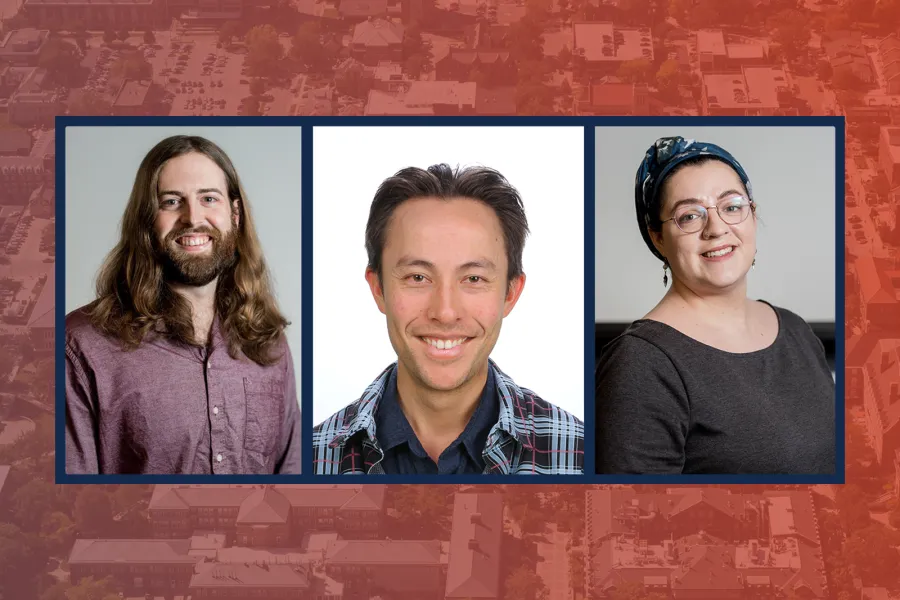Three graduate students at the University of Illinois Urbana-Champaign have been awarded Fulbright-Hays Doctoral Dissertation Research Abroad (DDRA) Fellowships: Owen MacDonald (History), Adrian Wong (Institute of Communications Research), and Marisa Natale (History).
Offered by the US Department of Education, Fulbright-Hays DDRAs are highly competitive fellowships that support dissertation-level research abroad in “modern foreign languages and area studies,” broadly defined. Generally, fewer than 150 Fulbright-Hays fellowships are offered nationwide each year. Fellowships provide a stipend, cover research and travel expenses, and offer up to 12 months of support.
Owen MacDonald will travel to Porto Velho, Rondônia, Brazil to study the importance of Black migration in the construction of the Madeira-Mamoré railroad. His project brings together archival research and studies of race, migration, and labor to paint what MacDonald calls a more complex picture of life in the Amazon that is both Brazilian and Caribbean. The fellowship also supports MacDonald’s research into the contributions of Black women from Barbados who migrated to Brazil, either alone or with their families, as workers on the railroad.
Receiving the Fulbright-Hays will allow MacDonald to spend an entire year in Brazil. “International historical research is expensive for a graduate student,” MacDonald says, and the Fulbright-Hays will allow him the opportunity to follow research leads freely and produce a project both ambitious in scope and created with connections to local scholars and historical actors.
Adrian Wong will travel to the greater Santiago Metropolitan Region to study the development of digital infrastructure in Chile amid the context of social and environmental inequality and Chile-China relations. The fellowship will provide him with the means to live in Santiago while surveying, interviewing, and analyzing data.
Wong is thankful for the opportunity that the Fulbright-Hays provides to fully immerse himself in his studies. Doing so will help him observe how barriers to sharing knowledge arise in digital infrastructure development. “Studying those barriers,” he says, “helps scholars understand how the relationship between communication practices and the implementation of digital infrastructure impacts social and environmental inequality in the region.”
Marisa Natale’s research will take her to Jerusalem and London to explore archival materials and the National Library of Israel. Her studies examine the British Empire’s interaction with Palestinian culture through criminal law and policing gendered crime during the era of the Mandate for Palestine. For Natale, access to archival materials is incredibly important: “They are incredibly revealing in terms of what the British believed about Palestinian culture and society,” she said, “and the archival record shows how these ideas influenced the law and became institutionalized.”
While some of the materials relevant to Natale’s study have been digitized, most what she’s seeking in archives is not available online, so travelling to visit in person is incredibly important. Doing so allows her the opportunity to study a diverse range of perspectives, she said, and can provide insight into how Palestinians perceived and responded to British involvement in intimate affairs. For Natale, receiving the fellowship has allowed her something precious—the ability to conduct her research while immersing herself in the local culture. “The most interesting thing about doing on-site historical research,” she says, “is that you have the opportunity to think about the ways the society you're immersed in was shaped by the events you study.”
Dr. Dana Johnson, Assistant Director of External Fellowships in the Graduate College, applauds this year’s awardees. “We are so proud of this year's Fulbright-Hays grantees,” she says, “and we wish them well as they set out to conduct fascinating and important research to not only complete their dissertations but also enrich our collective understanding of other world regions.”
Fulbright-Hays DDRA fellowships are open to students from any field who are conducting research focused on non-Western societies. Nationwide, awardees have come from fields as diverse as anthropology, public health, ecology and evolutionary biology, history, art history, education, languages and literatures, political science, environmental sciences, geography, and many others.
To help students apply for the Fulbright-Hays, the Graduate College’s Office of External Fellowships hosts an information session each spring and offers one-on-one advising to applicants. Students interested in applying next year can find details on the fellowship, the application process, and the Graduate College’s services in the Fulbright-Hays listing in the Fellowship Finder database.
For information on the Graduate College’s other resources to help students identify and compete for external fellowships, visit the Office of External Fellowships’ webpages.
Owen MacDonald Photo Credit: Holly Birch Photography
